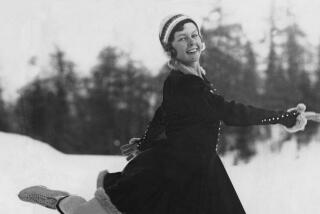Ultimate High Five
SALT LAKE CITY — Strange as it sounds, Eric Heiden says the magnitude of his speedskating gold medal sweep at the 1980 Lake Placid Winter Games hasn’t yet sunk in.
No matter that he made history by becoming the first athlete to win five individual gold medals in one Games. Or that in the five Games since, no one has come close to such domination of the sport.
Or that 22 years have passed since his triumphs.
Heiden still sees himself as he was in 1980, a floppy-haired 21-year-old from Madison, Wis., who took up speedskating because he liked to chase his younger sister, Beth, around the ice.
“It seems like just a few years ago,” Heiden said last week, looking little different at 43 besides some threads of gray in his thick, dark hair. “It really hasn’t set in. You look at these great athletes and to think you’re part of it, it seems pretty strange.”
Skating over the outdoor track in front of Lake Placid High on the town’s main street, Heiden set Olympic records in the 500, 1,000, 1,500 and 5,000. He also set a world record in the 10,000 despite oversleeping the morning of the race because he was too excited to rest after watching the U.S. hockey team’s upset of the Soviet Union.
“The Olympics were a little different then,” he said of the open-air oval and the tiny host city that formed the backdrop for his medals. “They’ve grown, for better or worse.”
Heiden is attending the Salt Lake City Winter Games as the orthopedic doctor for the U.S. speedskating team. He was asked to participate in the opening ceremony as one of the final torchbearers in a parade of U.S. Winter Olympic gold medalists, but he declined because he said he wanted the honor of lighting the caldron that holds the flame during the Games. That distinction went to the members of the 1980 U.S. Olympic hockey team.
Heiden seemed churlish for refusing a lesser role in the ceremony, but he has always taken the road less traveled and cared little about what others thought of him.
After he shattered his previous best time in the 10,000 by 15 seconds to win his last race, he stunned reporters and those eager to anoint him a hero by claiming the rewards were insignificant.
“I’d rather get a nice warmup suit or something,” he said. “Then I could use it. The medals don’t mean that much. The effort I put into the races is what’s important. The medals will probably sit where all the rest are, in my mom’s dresser, gathering dust.”
True to his word, Heiden kept only two of his medals--in a closet at his home. He believes the three others are in the linen closet of his parents’ home in Madison.
He left the sport after Lake Placid, returning to the University of Wisconsin and later going to Stanford medical school. He took up bicycle racing, winning the 1985 U.S. pro championship and a year later joining the first U.S. team to compete in the Tour de France.
After medical school he became an orthopedic surgeon at UC Davis Medical Center. He and another doctor work with athletes at the university, in addition to caring for the Sacramento Kings and athletes from U.S. Cycling and U.S. speedskating.
“I’ve always looked forward to giving something back to the sport,” he said. “I looked at doing it as a physician as an opportunity to do that.
“Sports meant a lot to me. A couple of years ago, after I completed my residency, I worked with the Dutch, and that opened the eyes of the U.S. team that Eric Heiden was available, and I’ve had a lot of fun.”
Veteran U.S. skater Chris Witty credited Heiden with helping her cope with mononucleosis.
“We made some changes in her training,” Heiden said. “We said her coaches could keep the quality of her training up, but they’d have to change the quantity. She’s a unique person. She doesn’t let things bother her.
“The big thing with Chris is she has mono and you don’t want to get her too fatigued. The coaches want to make sure her workouts are high quality, not high quantity. The fact she’s a sprinter makes it a little easier than if she skated the 5,000 meters.”
Heiden still skates and has even tried out racing’s latest technology, clap skates. But he tries to resist the temptation to offer skaters coaching tips. “I usually bite my tongue because I don’t want to get in the way of the coaches,” he said.
As for the U.S. speedskating contingent, which has already won five medals, he believes it will continue to flourish here despite the pressure of high expectations.
“Sometimes it’s hard when people expect big things from you because it puts pressure on your ability,” Heiden said. “Some athletes look at that competition as something they’re used to doing for years and years, and they come in well prepared.”
But he doesn’t expect anyone at these Games--or any other--to match his quintuple gold feat.
“The way speedskating is set up, with the World Cup format, you can make a living at one distance,” he said. “And you’re seeing [coaches] look for different body styles. I’d like it to happen, but I’m more and more doubtful.”
Heiden enjoyed an occasion he considered more momentous than the Olympics seven months ago when he and his wife, Karen, also an orthopedist, became parents of a daughter, Zoe. He said his wife was unaware of his Olympic feats when they met.
Those who saw him at those Games won’t forget it. And he carries with him one distinct, if odd, memory.
“It sounds funny,” he said, “but there was this corrugated tunnel we’d go through to leave the ice, and I remember leaving the ice after the 10,000 meters and thinking, ‘I’m never going to be in this kind of shape again in my life.’
“And I haven’t been.”
*
(BEGIN TEXT OF INFOBOX)
Five to Remember
Eric Heiden’s five speedskating victories at the 1980 Winter Olympics will be hard to match because of specialization in the sport:
(text of infobox not included)
More to Read
Go beyond the scoreboard
Get the latest on L.A.'s teams in the daily Sports Report newsletter.
You may occasionally receive promotional content from the Los Angeles Times.







